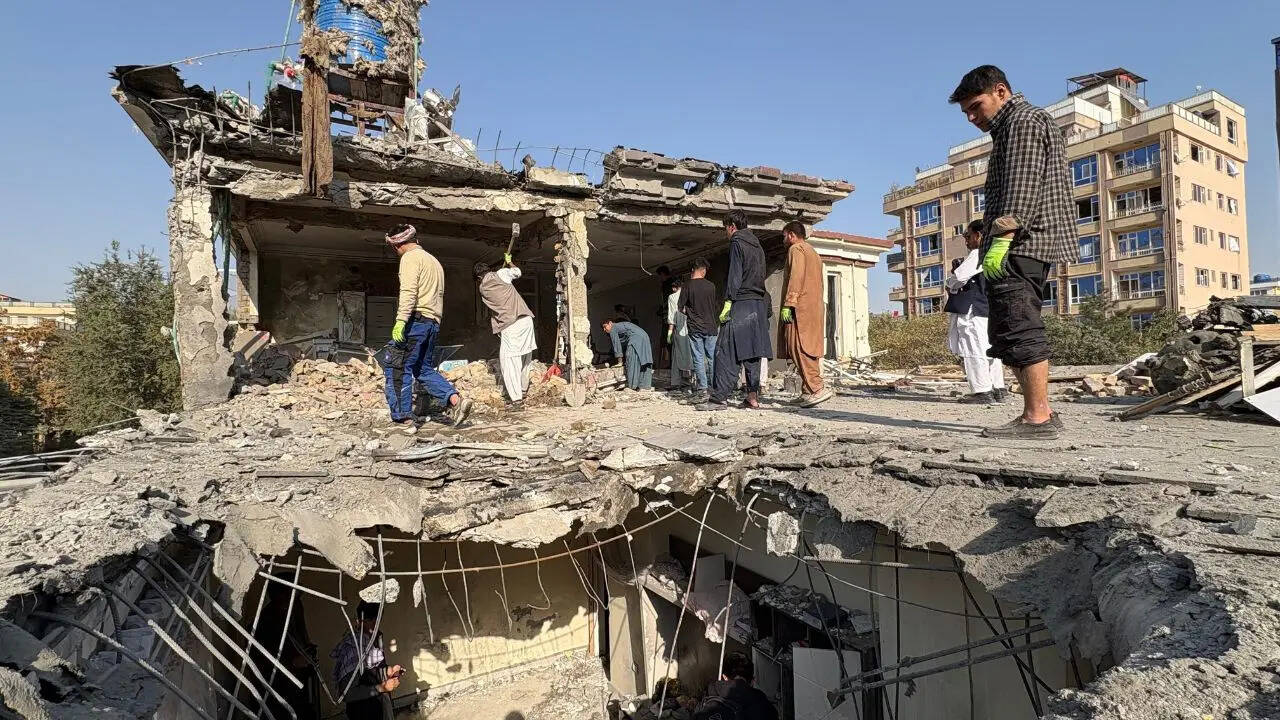
Residents remove debris from a house damaged by Wednesday’s strikes in Kabul. (Photo: AP)
New Delhi: The second round of peace talks between Pakistan and Afghanistan, held in Istanbul, ended without a breakthrough, prompting Islamabad to once again make wild claims and blame India for the latest escalations. Pakistan’s Defence Minister Khawaja Asif wasted no time in pinning the blame on New Delhi after the talks collapsed.
“…the people in Kabul pulling the strings and staging the puppet show are being controlled by Delhi,” Asif said.
“India is compensating for its defeat on their western border through Kabul. The junta there (in Afghanistan) has elements that have visited India and visited their temples,” Asif claimed.
“India wants to engage in a low-intensity war with Pakistan. To achieve this, they are using Kabul.”
Asif has levelled sharp allegations against Afghanistan, accusing Kabul of acting as a “tool for New Delhi” to spread terrorism inside Pakistan. The Pakistan Minister also warned that Islamabad would deliver a “50 times stronger” response if Kabul launched any attack on Pakistan.
“Whenever we got close to an agreement — either in the last four days or last week — when negotiators reported to Kabul, then there was intervention and the agreement was withdrawn,” Asif said. “I believe that the negotiations were sabotaged. We had an agreement, but then they called Kabul and backpedaled from the deal.”
Kabul has previously rejected similar accusations from Islamabad as baseless.
US Drones Behind Afghan–Pak Tensions?
A new flashpoint has emerged in the strained Pakistan–Afghanistan relationship, with reports suggesting that US drone operations from Pakistani soil may have played a key role in the collapse of peace talks between the two neighbours.
According to a TOLO News report on Wednesday, Afghan officials raised objections to Islamabad violating Afghan airspace with US drone flights and asked Pakistan to ensure that such violations stop in the future. The report added that Pakistan refused to accept this condition.
During the talks, it was reportedly revealed that a “foreign country” was using Pakistani territory to launch drone strikes inside Afghanistan. TOLO News later confirmed that the country in question was the United States.
“According to Afghan news channels, Pakistan has acknowledged signing an agreement with a ‘foreign country’ that permits drones to operate within its airspace for surveillance and potential strikes inside Afghanistan,” Kabul-based journalist Tameem Bahiss posted on X.
“For the first time, Pakistan admitted during these negotiations that it has an agreement with the United States allowing drone strikes, and claimed it cannot break that agreement,” TOLO News wrote on X on October 28.
Citing sources, the Afghan outlet reported that Pakistani negotiators initially agreed to some of the Afghan delegation’s terms but reversed their position after receiving a phone call, believed to be from Pakistan’s high command, stating that they had no control over US drones and could not guarantee action against ISIS.
“Qatari and Turkish mediators were also surprised by the Pakistani delegation’s conduct,” the report added.
While the phone call reportedly made the Pakistani side realise its commitments under the US drone agreement, Islamabad instead blamed the Taliban leadership and India for the breakdown in talks.
The conflict between Pakistan and Afghanistan reignited in early September after intensified attacks by the Tehrik-e-Taliban Pakistan (TTP) on Pakistani forces led to retaliatory airstrikes by Islamabad deep inside Afghan territory. The bombings, carried out using drones and JF-17 jets, left more than 200 people dead on both sides. The Taliban government claimed that dozens of civilians, including women and children, were killed in strikes on an eastern marketplace.
